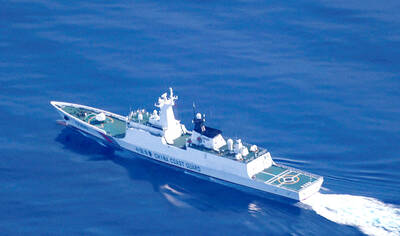Democratic White House candidate Barack Obama was in Iraq on a fact-finding tour yesterday, days after confirming plans to withdraw US troops from Iraq in 16 months if he takes office next year.
He was scheduled meet Iraqi Prime Minister Nuri al-Maliki, President Jalal Talabani and senior US military commanders, Iraqi and US officials said.
“Senator Barack Obama arrived in Iraq this morning as part of a Congressional delegation, along with senators Jack Reed and Chuck Hagel,” US embassy spokesman Armand Cucciniello said.
“The senators have a busy day ahead of them, as they meet with senior Iraqi officials, coalition leadership and officials from the US embassy. They will also meet with constituent service members and civilian staff working in Iraq,” he said.
This was Obama’s second trip to Iraq after a similar Congressional fact-finding tour in January 2006.
He had spent the night in Kuwait after a visit to Kabul, where he pledged to downsize the number of US troops in Iraq and commit at least two more combat brigades to Afghanistan.
Obama’s camp has said the aim of his tour is to make an on-the-ground assessment of the war in Iraq and to meet the country’s leaders, whom he has criticized for not doing enough to rebuild their country.
“Iraq’s leaders have failed to invest tens of billions of dollars in oil revenues in rebuilding their own country, and they have not reached the political accommodation that was the stated purpose of the [US troop] surge,” Obama wrote in the New York Times on July 14.
Obama also confirmed his pledge to declare an end to the Iraq war from the first day of his presidency if he wins in November, and to withdraw most US combat troops within 16 months.
Maliki and US President George W. Bush have agreed to include a “time-horizon” for the withdrawal of US forces in a security pact still being negotiated.
The Illinois senator, who voted against the March 2003 war to topple Saddam Hussein, is in Iraq at a time when violence has fallen to a four-year low — partly on the back of the controversial troop “surge,” which he had strongly opposed.
After more than five years at war, with more than 4,100 US troops and tens of thousands of Iraqis killed, Obama said on Sunday it was time to refocus US policy on the region that spawned the Sept. 11, 2001, attacks.
“They have sanctuary here,” he said of al-Qaeda in an interview with CBS in Afghanistan. “They are gathering huge amounts of money as a consequence of the drug trade in the region. And so, that global network is centered in this area.”
Obama called for at least two additional brigades, up to 10,000 troops, to be sent to Afghanistan.
“I think one of the biggest mistakes we’ve made strategically after 9/11 was to fail to finish the job here, focus our attention here. We got distracted by Iraq,” he said.
Republican presidential rival John McCain has lashed out at Obama for announcing his foreign policy even before his fact-finding visits.

‘HYANGDO’: A South Korean lawmaker said there was no credible evidence to support rumors that Kim Jong-un has a son with a disability or who is studying abroad South Korea’s spy agency yesterday said that North Korean leader Kim Jong-un’s daughter, Kim Ju-ae, who last week accompanied him on a high-profile visit to Beijing, is understood to be his recognized successor. The teenager drew global attention when she made her first official overseas trip with her father, as he met with Chinese President Xi Jinping (習近平) and Russian President Vladimir Putin. Analysts have long seen her as Kim’s likely successor, although some have suggested she has an older brother who is being secretly groomed as the next leader. The South Korean National Intelligence Service (NIS) “assesses that she [Kim Ju-ae]

In the week before his fatal shooting, right-wing US political activist Charlie Kirk cheered the boom of conservative young men in South Korea and warned about a “globalist menace” in Tokyo on his first speaking tour of Asia. Kirk, 31, who helped amplify US President Donald Trump’s agenda to young voters with often inflammatory rhetoric focused on issues such as gender and immigration, was shot in the neck on Wednesday at a speaking event at a Utah university. In Seoul on Friday last week, he spoke about how he “brought Trump to victory,” while addressing Build Up Korea 2025, a conservative conference

China has approved the creation of a national nature reserve at the disputed Scarborough Shoal (Huangyan Island, 黃岩島), claimed by Taiwan and the Philippines, the government said yesterday, as Beijing moves to reinforce its territorial claims in the contested region. A notice posted online by the Chinese State Council said that details about the area and size of the project would be released separately by the Chinese National Forestry and Grassland Administration. “The building of the Huangyan Island National Nature Reserve is an important guarantee for maintaining the diversity, stability and sustainability of the natural ecosystem of Huangyan Island,” the notice said. Scarborough

DEADLOCK: Putin has vowed to continue fighting unless Ukraine cedes more land, while talks have been paused with no immediate results expected, the Kremlin said Russia on Friday said that peace talks with Kyiv were on “pause” as Ukrainian President Volodymyr Zelenskiy warned that Russian President Vladimir Putin still wanted to capture the whole of Ukraine. Meanwhile, US President Donald Trump said that he was running out of patience with Putin, and the NATO alliance said it would bolster its eastern front after Russian drones were shot down in Polish airspace this week. The latest blow to faltering diplomacy came as Russia’s army staged major military drills with its key ally Belarus. Despite Trump forcing the warring sides to hold direct talks and hosting Putin in Alaska, there